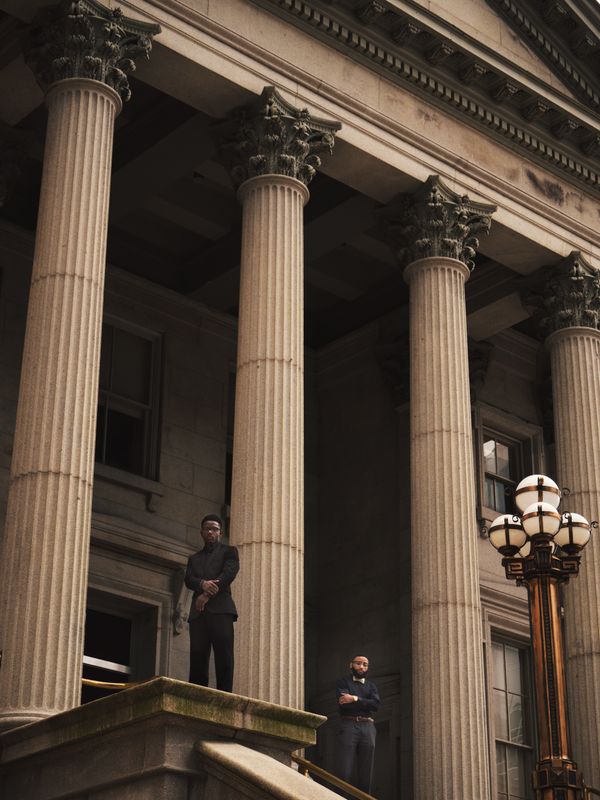The Trump administration recently repealed an order that allowed transgender students to use the bathrooms and locker rooms that coincides with their gender identity. This order, seemingly protected under Title IX, was put in place last year by President Barack Obama. Gavin Grimm, a transgender student from Virginia, has a case headed to the Supreme Court in March. Keeping with the theme of Trump's month-long presidency, WHY ARE WE STILL DEBATING THIS?! Trans rights are human rights. Gender identity and sex aren't the same thing. Transgender people are not dangerous, but they are likely to be harassed; we need to be protecting them, not questioning them. Nobody wants to spend any extra time pulling shenanigans in public restrooms... we all just want to do our business and get out. Let people go where they feel safe, where they feel comfortable. Offer a one-stall unisex bathroom if you can. We've been through this.
I wanted to share a piece I wrote for an Opinion Writing class I took last Spring. I wrote about North Carolina's HB2, which, sadly, is still a thing. The point is, we need to get over this made-up bathroom debate. People fear what they don't know, but there's nothing to fear. However, there's so much to be done in order to protect trans rights, and we need to move beyond the bathroom. Education and visibility is so important. We need to learn more and have more conversations with our transgender neighbors and figure out ways we can help them. We need to be calling out those who are discriminating and bullying and perpetuating false information and let them know that they are the ones in the wrong.
This was written in April 2016.
The conversation around HB2 is stuck in the bathroom and has been for weeks. It’s been in there so long, it’s time for someone to check on it and see if it’s doing alright.
Maybe you support House Bill Two, which bans transgender people from using the bathroom of the gender they identify with, and instead, they must use the bathroom that coincides with their assigned sex at birth. It allows for gay or transgender people to be fired from jobs or denied service at businesses simply because of their sexuality. HB2 also prohibits local governments and cities from expanding on their non-discrimination policies or loosening these restrictions that HB2 has set in place. Maybe you support that. But can you tell me what part specifically you agree with – the part where discrimination becomes legal, or the part where discrimination becomes legal?
Everyone I’ve talked to that supports HB2 has the same response: they’re worried about sexual assault in restrooms, they’re worried about a lack of privacy, they’re worried about the violence that will surely occur if we allow transgender people to use the bathroom they choose.
HB2 is terrible, I try to explain to them. It’s not just that people can’t use the restroom they feel most comfortable in, but also the fact that businesses can deny service or employment to people for being who they are — whether that’s someone in the LGBT community, or a veteran, or even a parent.
Blank stare. The supporter crinkles his brow in hesitation, then collects himself and replies, yeah, okay… but I don’t want perverts in the bathroom with my wife and daughter!
Let’s be clear. Absolutely NO ONE wants perverts in the bathroom. Let’s also be clear on another thing: if a pervert is determined to prey on someone in a public restroom, that person will not be swayed one way or another by a law. What was keeping them from doing it before the passing of HB2? To be clear on one last thing, it’s still illegal to assault someone.
Even our own governor, Pat McRory, who signed the bill, seems misinformed and unsure about what HB2 means for many people. “This (issue of what bathroom a transgender person should use) is a national debate that’s just come on literally in the past three months. No one had heard of this debate before,” McRory said on a very awkward interview with "Meet The Press." Just so everyone knows, while there’s been more transgender visibility in the media lately, identifying as trans and dealing with all the unclear situations our binary society creates for them is nothing new. McRory dismissed the seriousness of HB2, calling it “basically a restroom privacy bill” but admitting “some parts (of the bill) are poorly thought out.”
Everyone seems focused on the bathroom aspect of HB2. Supporters seem especially fixated, but it seems like those who oppose it are feeding into the made-up hype as well. This has been evident to me by the influx of posts I see daily on Facebook from both sides. Supporters of HB2 have imagined these ridiculous scenarios where transwomen prey on cisgendered women and children in the restroom. This simply doesn’t happen. Transwomen are the ones who worry about being assaulted and verbally abused in the restroom, especially if they are being forced to use the men’s room. “The new law forces many trans people to choose between breaking the law or going into restrooms where they face the possibility of discrimination and violence,” said Renee Wells, Director of the GLBT center at North Carolina State University. “The new law has also helped to create a climate in which people may feel more empowered to voice and act on their transphobia, which only serves to increase the anxiety and fear that trans youth face in public spaces.”
For weeks, I have seen the outrageous memes floating around Facebook and other social media. I saw a cartoon of a bearded man in a loose-fitting dress with a camera walking into a restroom, smiling mischievously at a horrified woman and child — he had a speech bubble that read, “Don’t worry lady, I’m transgender!” So much propaganda has been circling around that it creates fear of ridiculous situations. Those who protest the bill have been circulating viral messages online too, simplifying the problems of HB2 down to “Do you really want her in the men’s restroom?” (featuring the picture of a heavily made-up and voluptuous transwoman) and “Do you really want him in the women’s restroom?” (picture of a scruffy, bearded, muscular transman). This type of message is not helpful either — it makes it seem like those in the transgender community who do not “pass” as the gender they identify with are not as deserving of rights. All of these posts are giving us the wrong idea about HB2, and distracting us from the real issue of legalized discrimination, and the consequences of vilifying groups of people, ostracizing them from society with harmful associations.
“The arguments being used to rationalize the bathroom provision associate laws that provide protection and inclusion for the transgender community with the threat of predatory behaviors and sexual violence, which can create a climate in which people who observe someone that they perceive to be transgender as someone who may also pose a threat of sexual violence,” said Wells. “The psychological effect of having your identity invalidated and pathologized — and of having that be a dominant cultural conversation in the society in which you live — could cause trans youth to internalize harmful messages that damage their self-esteem, cause depression, lead to thoughts of self-harm, and may ultimately increase suicide attempts, which already impact 41% of the transgender population.”
Supporters of the HB2 love to talk about what horrific scenarios possibly go on in a public restroom, and those who oppose it love to respond and feed into the drama. Using the restroom at one’s will is a pretty basic human right, and this aspect of the bill is certainly worthy of conversation and concern. But it’s become a screaming match (or a pissing contest, if you will). Everyone is set in their ways. No one is being helped, but many are getting hurt.
If we’re going to talk about HB2 and convince people that it is wrong, we need to get past the bathroom thing. Yes, it’s an absolutely awful injustice, but we need a new angle.
“Right now we need to be intentional about helping people to better understand identity, how it develops, how diverse it is, how narrow our identity constructs are, and how those narrow constructs create problematic expectations for all of us, not just members of the transgender community,” said Wells. “We also need to do more to prepare educators and social service providers to understand the systemic barriers and oppressions that trans youth face, the specific needs they have as a result, and how best to support them.”
It’s insane to think that in 2016, a business could put a sign up on its door that stated that a group of people wasn't allowed to come in and that sign would be protected under the law. I feel like we’re regressing back to times of racial segregation. That wasn’t okay for blacks then, and it’s not okay for the LGBT community now. From our past mistakes of dividing people – from slavery to the Holocaust to having “white” and “colored” water fountains – haven’t we come to the conclusion that we’re all human? We may be different, but we all deserve to be treated as equals. Empathy and education are keys if we want to get people on board with impacting change and flush HB2 down the toilet.





















